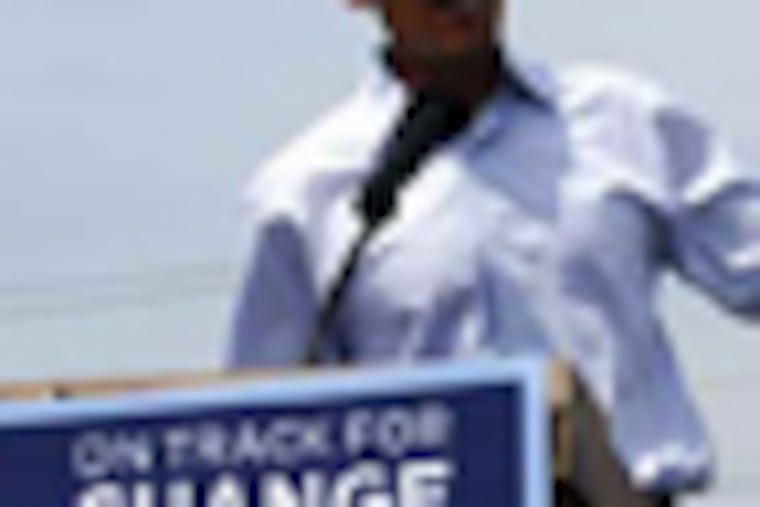As primaries end, Obama looks set to claim victory
The long and intense primary season ends today with Barack Obama positioned to nail down the Democratic presidential nomination within a day or two - if not hours.

The long and intense primary season ends today with Barack Obama positioned to nail down the Democratic presidential nomination within a day or two - if not hours.
Once the results are in tonight from South Dakota and Montana, and even before, many of the more than 150 undeclared superdelegates are expected to choose sides, likely pushing the Illinois senator over the magic number of 2,118 delegates.
Nearly 70 of the superdelegates are members of the House and Senate, and many of them are expected to move to Obama en masse tonight or tomorrow.
At this point, the only remaining questions appear to involve timing: Exactly when will Obama go over the top? And when and how will his rival, Hillary Rodham Clinton, acknowledge that he has done so?
Obama said yesterday that "it's my sense that between Tuesday and Wednesday we've got a good chance" of wrapping up the nomination. He said that he had talked with Clinton by phone Sunday and requested a meeting with her "when the dust settles." He did not describe her response.
Former President Bill Clinton, speaking to a campaign audience in South Dakota, said wistfully that "this may be the last day I'm ever involved in a campaign of this kind."
The way this all plays out could have a telling impact on coming efforts to try to unite the Democratic Party in advance of the Nov. 4 election.
Last night, Obama, who has stumbled along the path to the finish line with lopsided defeats in Kentucky, West Virginia and Puerto Rico, was within 42 delegates of the goal, while Clinton was 201 short. Sixteen delegates are at stake in Montana and 15 in South Dakota.
Obama is expected to win both of the final primaries, though indications are that the outcome in South Dakota will be closer than in Montana.
There were reports that the Obama campaign was pressing undeclared superdelegates to endorse him today so he could declare victory tonight. But some of those delegates appeared reluctant to do so out of respect for Clinton.
Obama, looking ahead to the general election, has scheduled his primary-night rally for the Xcel Energy Center in St. Paul., Minn., the same arena where Sen. John McCain will be formally nominated by the Republican Party three months from now.
Clinton will go back to New York, the state she represents in the Senate, for an election-night "celebration" in Manhattan.
Yesterday, Obama was campaigning in the Detroit suburb of Troy, Mich., in a state Democrats have carried by small margins in recent presidential elections. He assured his listeners that there would be a happy ending.
"Sen. Clinton has run an outstanding race, she is an outstanding public servant, and she and I will be working together in November," he said.
Clinton, stumping in South Dakota, was pressing her arguments that she would be the stronger candidate against McCain and that she has won the overall popular vote - which is extremely tight. Her hope is to keep the key congressional superdelegates undeclared long enough so she can meet with them tomorrow.
"This has been such an intense process," she said. "I don't think there has been a lot of time for reflection. It's only now that we're finishing these contests that people are going to actually reflect on who is our stronger candidate."
On Sunday, Gov. Rendell, who helped Clinton to her nine-point victory in the April 22 Pennsylvania primary, said he was confident his candidate would "do the right thing" and end her race should the numbers dictate that Obama had won.
Former Iowa Gov. Tom Vilsack, one of Clinton's national cochairs, made similar comments.
After Clinton's victory in the Puerto Rico primary Sunday, and the Democratic National Committee's decision Saturday to recognize the outcome in the disputed Florida primary, the overall popular-vote count is a virtual tie.
According to the RealClearPolitics.com, Obama's lead, which was 700,000 four weeks ago, is down to 24,586, less than one-tenth of one percent out of about 35 million votes cast. Other sources have it even closer.
Today's primaries figure to give Obama a net gain of fewer than 100,000 votes.
Obama's current lead grows to 134,808 with the inclusion of estimates from four caucus states - Iowa, Nevada, Maine and Washington - that did not release statewide turnout figures.
Clinton is ahead only if one counts, as she does, the results from the Jan. 15 Michigan primary, in which Obama was not on the ballot. The DNC's Rules and Bylaws Committee chose Saturday not to use that primary - which party officials had said in advance would not count - as the basis for allocating delegates.
Instead, the committee accepted a proposal from the state's Democratic leaders to give Clinton 54 percent of the Michigan delegates and Obama 46 percent.
In the nomination fight, the delegate count, not the popular vote, is decisive. The popular vote matters only to the extent it can be used to persuade the superdelegates to back Clinton.
The Clinton campaign cried foul over the Michigan decision and reserved the right to appeal it.
But that could become moot once the undeclared superdelegates make their choices known.
Today's Contests
of the nominating season take place today in South Dakota and Montana. Last polls close at 9 p.m. in South Dakota, which has 15 pledged delegates at stake, and 10 p.m. in Montana, which has 16.
EndText
See breaking campaign news, video and more
pavotes08 EndText